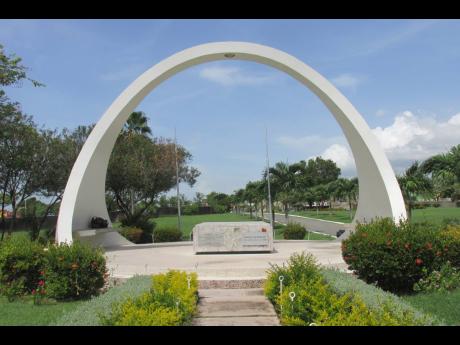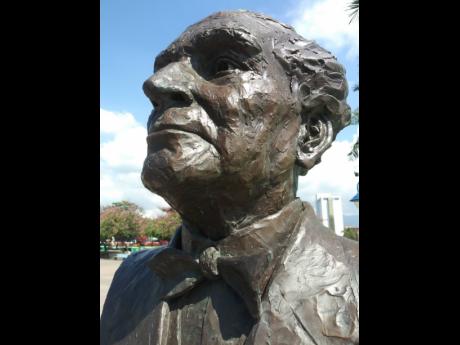Bustamante, father of independent Jamaica
ON FEBRUARY 24, 1884, William Alexander Clarke was born to Robert Constantine Clarke and his wife Mary (nee Wilson), a Jamaican of mixed races, in Blenheim, Hanover. He was their second of five children together. His siblings were Louise, Iris, Maude and Herbert. He also had two older sisters, Ida and Daisy, by a previous marriage of his father.
His grandmother, Elsie Clarke-Shearer, was also the grandmother of Bustamante’s contemporary, Norman Washington Manley. William Alexander Clarke changed his name in 1944 to William Alexander Bustamante, after a Cuban sea captain who befriended him early in his life. He married his private secretary, Gladys Longbridge, on September 7, 1962. The union produced no children.
For over three decades, beginning in 1905, Bustamante travelled extensively in the Americas, to countries such as Cuba, Panama, and the United States. He worked at various jobs in the area of security, dairy farming, transportation, pen-keeping, store clerkship, beekeeping, junior estate management, tramcar inspectorate, moneylending, and Wall Street speculating. It is said that he made a considerable amount of money speculating on the Wall Street stock market.
Upon his return to Jamaica in the mid-1930s, Bustamante’s moneylending business thrived. Yet, he was not oblivious to the lot of poor people. He got involved in trade union activities before 1938 and developed a public reputation as the voice of the voiceless. His voice became louder in the violent labour riots of 1937-1938, when workers from all over the island protested against low wages and scandalous working conditions.
Bustamante championed their cause, and his reputation as an effective labour leader was now sealed. He worked tirelessly all over the island, particularly at the Kingston waterfront and on the sugar estates. The colonial authorities regarded him a troublemaker and detained him in 1938. After his release, he founded the Bustamante Industrial Trade Union (BITU) in 1939. On September 8, 1940, he was again detained, at Up Park Camp, for allegedly violating the Defence of the Realm Act. In essence, Bustamante was successful in inspiring more strikes.
He grew up disliking the Crown Colony system of government that was instituted after the Morant Bay Rebellion of 1865. He thought it was full of too many social and economic challenges for the working class, whom he mobilised. He was folksy, dry-witty, charisma, outspoken, frank, fearless, insightful, benevolent; qualities that endeared him to the mass. Yet, he was also said to be dictatorial, arrogant and self-absorbed. But who is without human foibles?
Very much aware of his influence on the masses, ‘Busta’, as he was popularly called, used the membership of the BITU to help establish the Jamaica Labour Party in 1943. When Universal Adult Suffrage replaced the Crown Colony government in 1944, the Jamaica Labour Party won the island’s first general election that December, and Bustamante became the first chief minister of Jamaica from 1944 to 1955. He lost the election of 1955 to his cousin, Norman Washington Manley, who was chief minister up to 1959, when he became Jamaica’s first premier.
During Norman Manley’s tenure as chief minister of Jamaica, Bustamante was overseeing the Federation of the West Indies, which was established to form a political union that would help West Indian colonies to gain their independence from Britain. Bustamante became troubled by what was happening in the Federation and vowed to withdraw from it as soon as he was re-elected. Chief Minister Manley called for the Jamaican people to vote for or against the Federation. They voted to withdraw, and Jamaica did, which was the beginning of the end of the union.
Bustamante and Norman Manley helped to frame the Jamaican Constitution of 1962, in preparation for Jamaica’s independence from Britain. They are both regarded as Jamaica’s ‘founding fathers’. When Independence came along in August 1962, Bustamante became Jamaica’s first prime minister at age 80. Two years after taking office he became ill, and did not return to active involvement in the running of the country’s affairs of state. Hugh Shearer deputised.
After one term in office, Bustamante retired in 1967. Ten years later, he died at age 93 years.
For his hard work, tenacity, and commitment to the development of nationhood, Bustamante was awarded an honorary degree from the American University, Fairfield, Connecticut, in 1963; the honorary degree of Doctor of Laws from The University of the West Indies in 1966; was made a member of the Privy Council in 1963; and was awarded the National Order of Knight Grand Cross in 1966. He was also awarded the Distinguished Order of the Brilliant Star with special Grand Cordon by the government of the Republic of China.
In February 1968, the Jamaican House of Representatives and the Senate paid tribute to him. Later that month, the Bustamante Foundation was launched simultaneously in four countries as a permanent and lasting memory of Sir Alexander’s services to Jamaica. In 1969, William Alexander Bustamante became a member of the Order of National Hero, cementing him as one of Jamaica’s greatest sons. He was the first person to have received a Jamaican passport.


